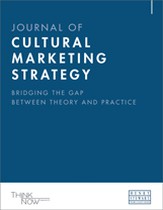The effect of ethnic-specific versus ethnic-diversified advertising: Comparing attitudes among multicultural consumers
Abstract
The diversity of minorities in the United States is growing and a demand for research in multi-ethnic advertising is emerging. This study aimed to compare the effect of ethnic and non-ethnic target-specific ads on young adult college students in the United States. Based on the social identification theory, a series of hypotheses were proposed to test the effect of ethnic-specific ads on consumer attitudes toward the ad, the brand, and the intentions to purchase the elicited product. An experimental research design was used to test the hypotheses among three ethnic groups: Hispanics, African American and White Non-Hispanics. The total sample size was 701. Models portraying stereotypes of the three ethnic-specific groups were used to produce four simulated advertisements. Three categories of ads were used to compare the effects of ethnic advertising: an ethnic-specific ad portraying one’s own ethnicity (AD1); an ethnic-specific ad portraying a different ethnicity group (AD3), and a diverse ad portraying a multi-ethnic group (AD2). Overall, this study indicates that diverse ads are less effective on young adult Americans than ethnic-specific ads. In addition, it was found that diverse ads (AD2) produce better effects on young African and Hispanic Americans than White Americans, and White Non-Hispanics respond best to their own ethnic-specific ad when compare to the other two ethnic groups.
The full article is available to subscribers to the journal.
Author's Biography
Enrique Becerra is an associate professor in marketing in the McCoy College of Business Administration at Texas State University. His research has been published in the Journal of Advertising Research, Journal of The Academy of Marketing Science, Journal of Business Research, and European Journal of Marketing among others. Dr Becerra’s research revolves around culture, ethnicity, and identity and their effects on consumers, including effects on advertising, retailing, and consumption.
Sindy Chapa is the director of the Center for Hispanic Marketing Communication at Florida State University (FSU). Dr Chapa is published in recognized academic journals including International Journal of Advertising, Journal of Advertising Research, International Business & Economics Research, Journal of Marketing Communication, Journal of Spanish Language Media, Journal of Consumer Behavior, and Journal of Multidisciplinary Business Review among others. Dr Chapa’s research concentrates on understanding Hispanic and cross-ethnic consumer behavior in the area of cross-cultural marketing communication and advertising.
Delonia Cooley is an associate professor of marketing at Texas Southern University, and the owner/operator of D & C Consulting. Dr Cooley has published her research in the Journal of International Consumer Marketing, Journal of Internet Commerce, International Journal of Pharmaceutical and Healthcare Marketing, and Academy of Marketing Science Review among others. Her research interests cover topics such as, health care marketing, online communities, ethnic marketing, social media and communication, distance learning and education, as well as, cross-cultural behavior and advertising. She has also published a book, ‘Are You Making the Right Impression? Preparing NOW for Life after College’.
